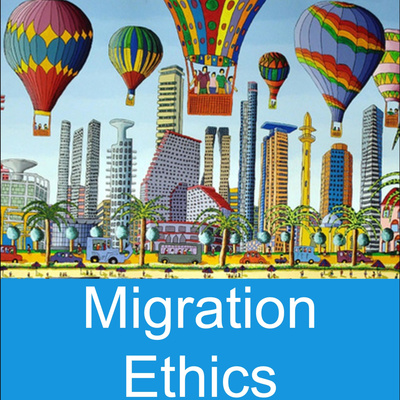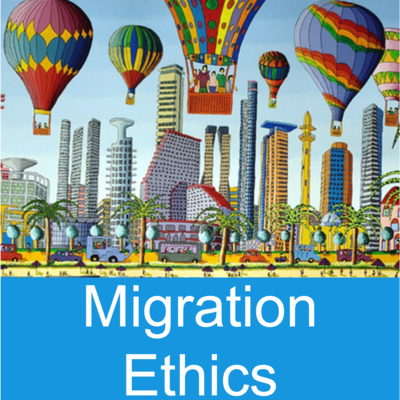
Migration Ethics
By Kieran Oberman
Cover art by Raphael Perez.

Migration EthicsAug 19, 2022

Philosophy Takes on Liz Truss
We share a recent episode of another philosophy podcast Philosophy Takes on the News. It’s a show in which philosophers chat about the latest events. In this episode, guests chat about Liz Truss’ rise to power, floods in Pakistan, reparations for climate change and much more besides.

Paul Bou-Habib on the Real Problem with Brain Drain
Here’s three facts about the Nigeria. Fact one: Nigerians have just 4 doctors per 10,000 people. For comparison, the UK has 30 doctors per 10,000 people, that’s more than seven times as many. Fact two: life expectancy in Nigeria is just 55. In the UK it’s 81. Fact three: half of Nigerian doctors are currently working abroad. Some take such facts as a sign of the costs of migration. They blame migration for draining poor countries of the skilled professionals they desperately need to address poverty and disease. Paul Bou-Habib, from Essex University, has a different take. He thinks that the real problem here is one exploitation. Rich countries are benefiting from migration without giving back. So, what are the costs of skilled migration? What is exploitation and how does it differ from related concepts such as robbery and theft? And if Paul is right that brain drain is a serious ethical problem, can philosophers really do anything to solve it?

Helen Frowe on the Case for Refugee Discrimination
What do Albert Einstein, Madeleine Albeit and Freddie Mercury have in common? Well, at least two things. All three were refugees and all three made dedicated contributions in their respective fields. In these respects, they are not unique. Most refugees work and pay taxes. Many contribute more to their host countries than receive back in benefits. By selecting refugees based on their ability to pay, governments can maximise the chances that those they admit will, at the very least, offset the costs of their resettlement. Refugee advocates often decry such selection as unjust discrimination. In their view, the sole criteria for selection should be need. So, who is right here? Helen Frowe, from Stockholm University, offers a surprising answer. She thinks that selecting for ability to pay can be permissible. Indeed, she thinks it can be morally required. So, what is the argument for this form of selection? Can it be morally distinguished from racial or religious discrimination? And how does Helen answer the claim that what she is proposing is simply unfair?

Rufaida Al Hashmi on Immigration and Historical Injustice
In 1882, the US government passed the Chinese Exclusion Act banning the entry of Chinese people into the United States. The act was the product of a decades long campaign by white nativists against the influx of Chinese workers to California. It was the first act in US history to exclude people on grounds of race. Looking back, the Chinese Exclusion Act seems clearly unjust. Immigration policy should not discriminate on racial grounds. But if the Chinese Exclusion Act was unjust, does this have any implications for immigration policy in the present day? Rufaida Al Hashmi, from Oxford University, believes so. She thinks that unjust restrictions in the past can ground a right to admission in the present. In her view, we can and should use immigration policy to help correct historic wrongs. But how can wrongs committed against people who are now long dead ground rights for present populations? Who exactly has these rights and how can we identify them? And why is immigration a good means to correct historic wrongs when current populations may have no desire to migrate?
Rufaida Al Hashmi is a doctoral student at Nuffield College, Oxford. Her article, Historical Injustice in Immigration Policy, was published in Political Studies in 2021.
Cover art by Raphael Perez.

Jamie Draper on Climate Displacement
In 1951 diplomats from around the world met in Geneva, Switzerland to sign the UN convention relating to the status of refugees. The Convention was designed to address the most pressing cause of displacement in Europe at the time: the persecution of minorities and political opponents by authoritarian governments. In the years since, we've come to learn of a new threat: climate change. The changing climate and associated weather events are forcing many to leave their homes. The 1951 Convention does nothing to protect these people. So, what should be done?
One suggestion is that we sign a new convention, create a legal category for those displaced by climate change and award them a set of uniform rights. Jamie Draper from Oxford university is not convinced. Today. I asked him why. Also, what have philosophers had to say about climate displacement? What does justice demand in the case of sinking island states? And why are so many people against using the term “climate refugee”?

Victor Tadros on Refuge and Aid
The UK government is, once again, promising to get tough on migration. The Nationality and Asylum Bill, introduced to parliament by Home Secretary Preti Patel, is designed to make it as hard as possible for people to claim asylum. When challenged, the government likes to talk up its contributions to foreign aid. But what do aid and migration have to do with each other? Well, perhaps the logic is this. There are many people in need throughout the world and most of them do not migrate. By providing aid, rather than admitting migrants, governments can help more people or people in greater need. But do migrants have some special claim to priority? Victor Tadros, from Warwick University, argues that, for the most part, migrants have no special claim. Yet he also insists he is pro-migration. So, what are the relative claims of migrants against others in need? Is there a trade-off between refuge and aid? And does Victor worry about an overlap between his views and those of anti-migration politicians?

Mollie Gerver on Ethical Border Enforcement
During the Trump administration, US border agents were directed to separate detained migrants from their children. That produced an outcry. Under Biden, border agents have been photographed using horses to charge at migrants trying to cross the border. That too has an produced outcry. But if these measures are wrong, which measures a permissible? After all, few people think the border restrictions can never be justified no matter what the circumstances. How then should borders be enforced? Mollie Gerver from the University of Essex has tried to identify the relevant moral principles. And she's done something else as well, something philosophers rarely do: empirical research to find out whether the public agree with her.
Mollie Gerver is a Lecturer in Political Theory at the University of Essex. She is the author of the The Ethics and Practice of Refugee Repatriation. The article we discuss is not yet published, but if you are interested, please follow @molliegerver or @kieranoberman on Twitter and we will link to it once it is out.
Cover art by Raphael Perez.